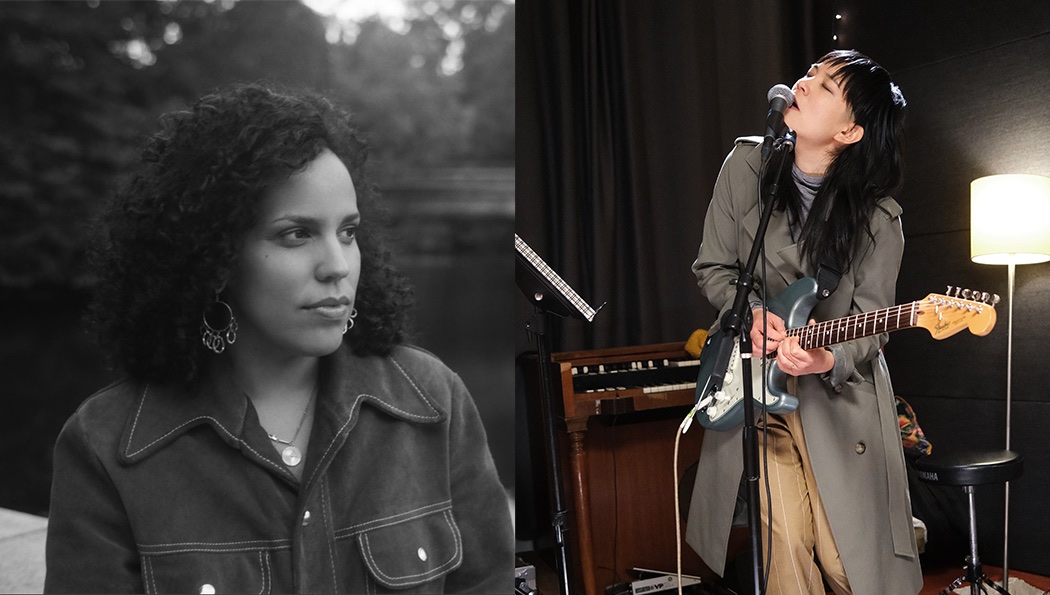Back in 2019, the organization Sounds of Saving launched a series called “Song That Found Me at the Right Time” in an effort to raise awareness about mental health—and in the years since then, this initiative has become even more important. Earlier this summer, SOS teamed up with the National Suicide Prevention Lifeline to co-produce sessions from two inspiring artists who have been open about their own struggles with mental health: Xenia Rubinos and Thao.
For the series, Thao Nguyen (formerly of Thao & the Get Down Stay Down) covered Björk’s 1993 classic “Human Behavior,” while Rubinos covered Nai Palm of Hiatus Kaiyote’s song “Homebody.” In addition to performing the song, in each video the artist discusses their own struggles with mental health and the importance of balancing their creative work with self-care.
We decided to extend this conversation by getting them on a call together to find out why this initiative is so important to each of them, to discuss the unique challenges that artists face, and to discover what interventions they’ve found to be effective for themselves.
I’m curious if you feel like there’s less of a stigma about mental health today, and what your thoughts are on the current state of mental health when it comes to musicians.
Thao: I think there’s definitely less stigma because everyone has kind of agreed there’s less stigma, which I’m really appreciative of. I’ve benefited so much when people are willing to speak openly about their struggles, so when I get the opportunity to do so it feels part of the greater effort, everyone trying to help each other.
Xenia: I think it’s different for everyone, but in my case I want to represent what the ideas are in the music, so there’s this feeling of, “What if I don’t feel that way?” I don’t want to bum people out. So I think when people are able to talk about the reality of what they’re going through, anything, it just pulls back the veil a little bit and it makes it OK. Like we’re repping for other people who are just going through it and are just normal human beings and it’s like, “Oh no, you can be great, you can be Thao and super cool and tour and play the coolest venues and make the coolest music and you can also have other things happen. They’re not mutually exclusive.”
“I’ve benefited so much when people are willing to speak openly about their struggles, so when I get the opportunity to do so it feels part of the greater effort, everyone trying to help each other.”
— Thao
Thao: I totally agree with that, and I so appreciate [that statement] along the lines of offering a more realistic representation and interpretation of what’s happening. This job, we are so lucky to have it in so many ways—but to do this for a living you have to exude such confidence. You have to have this almost irrational belief in yourself, and you have to sustain it in order to keep making stuff and keep putting yourself out there, and that’s not realistic. It can be very quickly unsustainable, so the way to make it sustainable is to be honest about what tolls that can take and what we do to help each other recover or find reprieve to build our resources back up so we can go out there again. Because I think we’ve all paid the price of thinking you’re just supposed to keep going and not absorb anything and not be injured by it.
Musicians have such a unique set of challenges. It’s so different from other occupations, obviously.
Thao: I think because things are shifting and dialogue is so much more nuanced now, there’s way more platforms for people to have real conversations like we’re doing here, and the industry shifts a little bit where the expectations are such that you can exist in multiple dimensions. Whereas before [the sentiment was], “You’re lucky to be doing this, to get this exposure or this opportunity.”
Xenia: The pandemic has also turned up the volume on a lot of things that have always been an issue, and recently one of the things I feel people are being more vocal about is the burnout of touring and the expectations and financial ramifications. It feels like we’re constantly expected to be in a stance of gratitude, like “I’m so lucky”—which is true, but just because we’re privileged to play music doesn’t mean you won’t burn out on tour. We are lucky to be able to do this, but it’s also about acknowledging and being able to express, “Hey, this is what’s going on with me, this is what’s difficult about it” and that being OK.
Thao: And to remind each other that we have self-worth outside of music and how it’s received, because I unfortunately have logged years worth of doing that. It’s such a vulnerable and all-encompassing kind of practice, and you’re trying to make a living at it. Everything you have is offered and you can’t control how people receive it, and that’s taken me so long to separate myself from. Unfortunately, you really start to do that when it’s become so untenable and so dangerous that you have no other choice, you’ve got to do something differently.
“It feels like we’re constantly expected to be in a stance of gratitude, like ‘I’m so lucky’—which is true, but just because we’re privileged to play music doesn’t mean you won’t burn out on tour.”
— Xenia Rubinos
Could you talk a little about the songs you picked for the “Song That Found Me at the Right Time” series?
Xenia: I chose a song called “Homebody” by Nai Palm, who is a vocalist, musician, and composer who I really admire. The collab was really sweet—we spent a lot of hours in the park singing in a tunnel and doing takes. I was grateful for the opportunity to share and to do some processing. I was also really nervous to talk about my experience, but I was just grateful that this is an initiative that’s happening. It just feels very genuine when you see people being real and talking about their experience and connecting with their music practice or just a song that they love. I’m grateful for it.
Thao: Me too. I covered Björk’s “Human Behavior”' with friends, an Oakland-based band called Secret Sidewalk. I chose it because in part I’m not as familiar with Björk’s catalog as I would like to be, but she’s always been this artist that was so devoted to music—and in choosing the song it was kind of an offering and a nod to a different way of being with music and embodying and capturing the joy of what collaboration in music can be. I’ve loved music forever, but it’s also been such a source of grief and sorrow because when I started doing it for a living I wanted to quit many times. It was just this way to distill and start anew in honoring what music can be and should be and often is, but then it gets diluted and polluted by other elements. Now I’m in a much better place, I can be more clear about what it is I can give and what it is I’m trying to accomplish.

Thao & the Get Down Stay Down / photo by Adrian Santos
Thao, in your video you talk about how meditation helps you with your struggles. What other interventions have you both found to be helpful?
Xenia: Oh honey, I threw the kitchen sink at it, so there’s no telling which one made the difference. But we did it all, a little bit of everything, and we’re here. Therapy, a psychiatrist tried some medications, I went to an Indigenous healer. I was like Solange in that song: “I tried to work it away, I changed it with my hair.” I did everything, it feels like. I love my therapist, I’m really grateful to find somebody who I trust and who I’ve built a relationship with over the last couple of years, and I’m building a relationship with myself, too, as a result, so that’s been super helpful. And then free writing as a daily practice, grounding exercises like breathing exercises. But just to be completely honest, not all of those things worked every time.
I kept trying and it did get better in time. Everyone would say “it will get better,” and it actually did, but I just didn’t believe anybody. It actually did because of the consistency, and I wanted to get better and feel good and get through this depression. Now I have all of those tools I didn’t have before like, “Oh, I’m noticing I’m not sleeping, that’s important,” or “Oh, I didn’t eat,” or “Oh, I’m stressed and here’s what I’m going to do about it.”
“Everyone would say ‘it will get better,’ and it actually did, but I just didn’t believe anybody. It actually did because of the consistency. Now I have all of those tools I didn’t have before.”
— Xenia Rubinos
Thao: I know I referenced this in the episode, but therapy—it’s [helped] so much that I don’t even go regularly anymore, but I keep in touch with my therapist and can go when I have the need. And daily writings and meditations in the morning. I’m a huge fan of Questlove, as we all are, and whenever Questlove suggests something I’m all about it. He’s talked a little bit about this meditation guy he listens to named Dr. Joe Dispenza, and it’s what you think it might sound like, but I really went there because I kept saying, “If it worked for Questlove, I’m doing it.”
You basically envision what you want for yourself; it’s kind of a manifestation thing, and there are so many different resources for it, but you just find the one that speaks to you. It’s really helped around work and helped me curb the self-doubt and just stay really focused on working, because every day you’re like, “How will you be today, what are you going to do and not going to do?” It just helps me organize my mind for the day and that’s all I can do. Because if you spiral out then you can’t get any work done…and that always was so painful for me. FL







